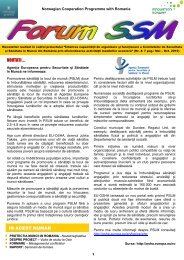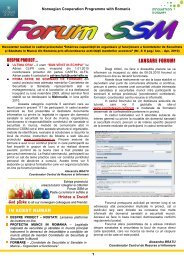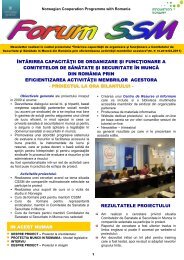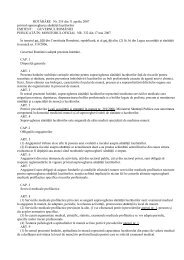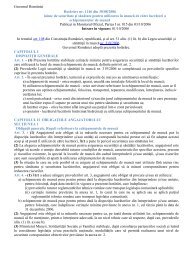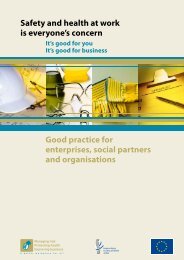Preventing work-related musculoskeletal disorders - European ...
Preventing work-related musculoskeletal disorders - European ...
Preventing work-related musculoskeletal disorders - European ...
You also want an ePaper? Increase the reach of your titles
YUMPU automatically turns print PDFs into web optimized ePapers that Google loves.
<strong>Preventing</strong> <strong>work</strong>-<strong>related</strong> <strong>musculoskeletal</strong> <strong>disorders</strong><br />
The joint venture between the three administrations would see stunt<br />
men perform every 20 minutes on the big stand, re-enacting <strong>work</strong><br />
accidents, showing how accidents arise where safety is not properly<br />
managed and, in contrast, how safe <strong>work</strong>places operate.<br />
For further information contact: Paul Weber, Inspection du travail<br />
et des mines, email: paul.weber@itm.etat.lu, websites:<br />
http://www.itm.etat.lu or URL: http://lu.osha.eu.int<br />
IRELAND<br />
Relatively few back injuries occur due to a single event. The<br />
conventional wisdom that <strong>work</strong>ers should always bend the knees<br />
and not the back when lifting may not be right. And those<br />
responsible for designing <strong>work</strong> should ensure that the most<br />
demanding bending loads on the low back are not undertaken<br />
shortly after rising from bed.<br />
These are just some of the provocative and challenging propositions<br />
which participants at a major Irish national conference on <strong>work</strong><strong>related</strong><br />
MSDs heard in June, as part of Ireland’s participation in the<br />
<strong>European</strong> programme on MSDs. The conference was organised by<br />
Ireland’s Health and Safety Authority and the Irish Ergonomics<br />
Society.<br />
Prof Stuart McGill of the University of Waterloo in Canada<br />
challenged conventional wisdom that it is always better to bend the<br />
knees and not the back - that is squat, not stoop - when lifting.<br />
Many <strong>work</strong>ers prefer to stoop, perhaps because there is “an<br />
increased physiological cost in squatting”. Citing recent research<br />
comparing stooping and squatting when lifting, he said it concluded<br />
that “at least in terms of low back compression”, neither technique<br />
can be justified over the other.<br />
“The case could be made that the important issue is not whether it<br />
is better to stoop lift or to squat lift but rather the emphasis could<br />
be placed on placing the load close to the body.” This is to “reduce<br />
the reaction moment” and “avoid a fully flexed spine to minimise<br />
shear loading”, he said.<br />
“In fact, sometimes it may be better to squat to achieve this, or in<br />
cases where the object is too large to fit between the knees, it may<br />
be better to stoop, flexing at the hip but always avoiding full flexion<br />
to minimise posterior ligamentous involvement.”<br />
Commenting on the diurnal change in spine length, he said there<br />
could be an increased risk of back injury early in the morning.<br />
Managers and people responsible for the design of <strong>work</strong> should<br />
“design jobs so that the most demanding bending loads on the low<br />
back are not conducted early in the morning or shortly after rising<br />
from bed,” he said.<br />
The current practice which tends to require <strong>work</strong>ers and medical<br />
personnel to identify “the single cause of injury”, that is a specific<br />
event accounting for an injury, is not attuned to recent advances in<br />
the scientific understanding that “much injury is the result of<br />
cumulative trauma”. Accordingly, an “overhaul of the current injury<br />
reporting system needs to be considered,” he said.<br />
Ireland also participated in the <strong>European</strong> Week’s focus on MSDs<br />
through a series of talks around the country in September and<br />
October on preventing <strong>work</strong>-<strong>related</strong> MSDs organised by the Health<br />
and Safety Authority. The Authority produced a free guidance<br />
booklet on manual handling Handling With Care - Safe Manual<br />
Handling. Meanwhile, the HSA used billboards in train stations,<br />
trains and on buses in Dublin with the message: “The Straw that<br />
Broke the Camel’s Back: Lifting at Work Shouldn’t Break Yours!”<br />
For further information contact: Ruth O´Flaherty, Health and Safety<br />
Authority, email: ruth_oflaherty@hsa.ie, website:<br />
http://ie.osha.eu.int<br />
GERMANY<br />
<strong>European</strong> Week generated a lot of interest in Germany where MSDs<br />
account for some 29 per cent of all sickness absence days from <strong>work</strong><br />
and are the greatest cause of disability. There was great interest in<br />
participating in the Week, with a lot of applications received for the<br />
<strong>European</strong> Week good practice award.<br />
Two conferences were set to take place during the Week. The first<br />
was organised by an association of professional insurance<br />
companies for 25 October in Stuttgart.<br />
Conference themes included how to prevent MSDs, <strong>work</strong>-balance<br />
perspectives for successful MSD prevention and how different jobs<br />
give rise to MSDs. Practical examples were given from small and<br />
medium sized enterprises in different sectors, including the textile<br />
industry, construction, wholesale and storage, the meat industry,<br />
health care and metal industries. Directed at employers, employees,<br />
physicians and OSHA-institutions, the conference had a particular<br />
focus on <strong>work</strong>ing conditions in SMEs.<br />
The conference, which combined reports and <strong>work</strong>shops, was held<br />
under the patronage of the Prime Minister of the Federal State<br />
Baden-Württemberg, Mr. Erwin Teufel.<br />
The second conference, the Multiplikatoren-Kolloquium (the<br />
multiplicator colloquium) was planned for 24 October in Potsdam<br />
organised by the institute of occupational health and safety in the<br />
federal state of Brandenburg, which the German Labour Minister,<br />
Mr. Walter Riester was due to attend.<br />
It aimed to address the epidemiological problems of MSDs, methods<br />
for analysing and assessing MSDs and prevention strategies, results<br />
and experiences in various <strong>work</strong>places. It set out to present an<br />
outlook for what to do in the future.<br />
The conference was organised for employers and employer<br />
associations, employees, trade unions, staff associations and<br />
<strong>work</strong>ers’ councils. Occupational physicians, regional OSHA services,<br />
national and federal states OSHA institutions, insurance companies<br />
and politicians were also targeted.<br />
For further information: Frau Brigitte Steck, Bundesministerium für<br />
Arbeit und Sozialordnung, email: br.steck@bma.bund.de, website:<br />
http://de.osha.eu.int<br />
<strong>European</strong> Agency for Safety and Health at Work<br />
35



